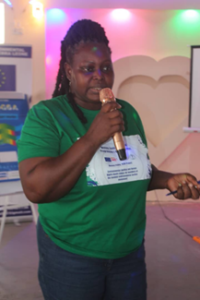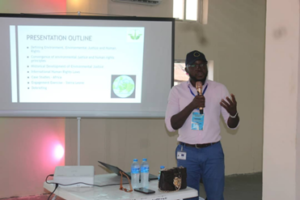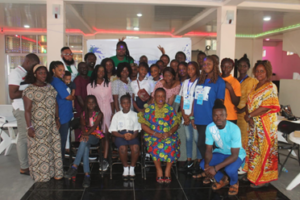In a bid to achieve the Women Power 2030 Sustainable Development Goals (SDG), the Women Environmental Programme (WEP), with support from the European Union through Women Engage for a Common Future (WECF), recently organized a two-day practical workshop aimed at equipping young feminist environmental activists and organizations with practical issues to attain safer environment.

The training, held on December 19th and 20th, 2024, at the Two Brothers Auditorium on Syke Street, Freetown, Sierra Leone, brought together participants from various feminist and environmental organizations within the western region and beyond.
WEP is a non-governmental, non-profit, and non-political organization headquartered in Abuja, Nigeria, with offices in Sierra Leone, Tunisia, Togo, Burkina Faso, Niger, and Canada. Its vision is to transform the lives of women and youths worldwide through four program areas: Environment, Climate Change, Women and Girls’ Issues, and Peace and Security.
The workshop was part of the broader “WomenPower2030” initiative, a Financial Framework Partnership Agreement (FFPA) between the European Union and a consortium of five feminist organizations led by WECF.
The initiative aims to strengthen the capacities of women’s and feminist civil society networks to fight inequalities, advance gender-equal sustainable development, and influence regional and global policies.
In her opening remarks, the Chief Executive Officer Of WEP Sierra Leone, Madam Stalina Princess H. Voegli, emphasized the workshop’s goals:
Equipping participants with practical knowledge of environmental issues
Encouraging innovative ideas and fostering collaboration among participants
Creating a platform for knowledge exchange, hands-on learning, and professional development.


She noted that the skills acquired would be valuable for both advocacy and economic empowerment, particularly in deepening the fight against harmful environmental practices. Madam Stalina urged participants to fully engage in the sessions to maximize their learning and professional growth.
One of the facilitators, John Abu-Kpawoh, spoke on Environmental Issues Impacting Women in Sierra Leone through the Lens of the Sustainable Development Goals (SDGs) in three Modules.
Module I – Understanding Environmental Justice and Human Rights
Module II – Environmental Justice and HR Issues hindering Sustainable Development
Module III – Advocacy for Environmental Justice. He started by calling upon female activists and organizations to unite in addressing the pressing environmental challenges that disproportionately affect women in Sierra Leone.
“In the face of climate change, deforestation, water scarcity, and environmental degradation, it is women—particularly in rural areas—who bear the brunt of these challenges. These issues are intertwined with poverty, health, and social inequality, making them critical areas of intervention under the Sustainable Development Goals (SDGs),” he said, adding by highlighting key issues in the Sustainable Development Goals by mentioning SDG 5: Gender Equality. He explained that Environmental issues amplify the gender disparity in Sierra Leone. Women are often tasked with fetching water, farming, and providing for their families, yet they have limited access to resources and decision-making platforms. We must advocate for policies that empower women, ensuring they are actively involved in environmental governance at all levels. He furthered that SDG 13: Climate Action; Climate change is not just an environmental issue—it is a humanitarian crisis, particularly for women in vulnerable communities. Female activists and organizations must champion community-based climate adaptation strategies, focusing on sustainable farming practices, disaster preparedness, and reforestation projects led by women. SDG 6: Clean Water and Sanitation, he emphasized that Access to clean water is a fundamental right. Women and girls in Sierra Leone often spend hours fetching water, exposing them to physical and health risks. We need collective action to improve water infrastructure and sanitation, enabling women to live healthier and more dignified lives. SDG 15: Life on Land: he narrated that the degradation of Sierra Leone’s forests and ecosystems threatens livelihoods, especially for women who rely on natural resources. Activists and organizations should promote reforestation and educate communities about sustainable land-use practices.
“Addressing these challenges requires collaboration. I urge female activists to build partnerships with local communities, international organizations, and government agencies. Together, we can secure funding, develop innovative solutions, and implement policies that address environmental issues through a gender lens,” he concluded.
Another facilitator, Mustapha Ansumana, continued with
Module IV
Behavioural Changes Communication
Module V
Environmental Governance, he stated that the world stands at a critical juncture, where the voices of women are more vital than ever. He added that Women and girls, especially in vulnerable communities, bear a disproportionate burden of the challenges posed by environmental degradation and climate change, adding that it is imperative that their voices echo loud and clear in the fight for environmental justice and women’s protection.
“Your courage and determination are the keys to unlocking a future where women are not only protected, but empowered to lead. As activists, you hold the power to influence policies, educate communities, and inspire a movement that prioritizes the safety, dignity, and rights of women in environmental spaces,” he inspired the young women, and urged the young female environmental activists to take up this mantle with passion and resilience by advocating for equitable access to resources, protection against environmental hazards, and the inclusion of women in decision-making processes.
“Remember, your efforts today will pave the way for a world where women are not just survivors, but leaders and change-makers in the face of environmental challenges. Together, we can build a future that respects both our planet and the women who nurture it,” he challenged the young women to do more.
The participants were enthusiastic about the knowledge and skills gained during the workshop. Group work and presentations were done on both days.
Musa Brima highlighted that the workshop opened his eyes to the vast potential of their advocacy in creating meaningful changes in addressing climate change. He noted the importance of strategic communication and planning in creating impactful environmental campaigns.
Ramatu Conteh expressed gratitude to WEP for organizing the workshop and called for more training opportunities to empower activists to deepen their knowledge in advocating for environmental issues.
The event concluded with the awarding of certificates to all participants.
The Women Environmental Programme reaffirmed its commitment to empowering women and youths, fostering gender equality, and advocating for sustainable development through similar initiatives in the future.